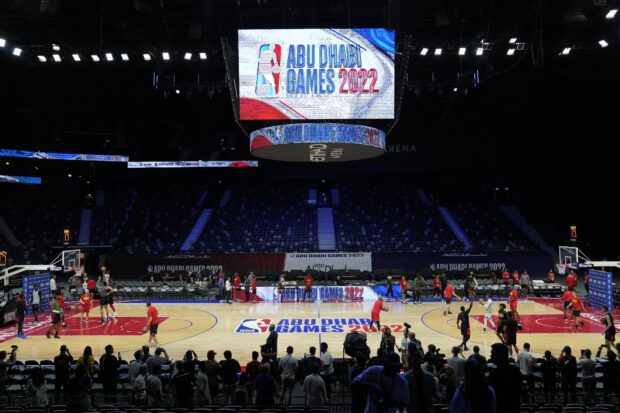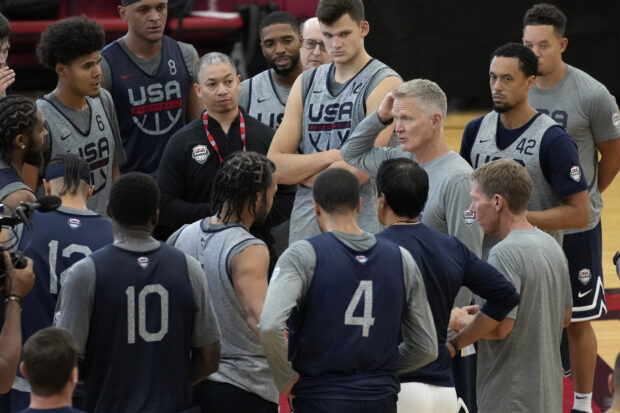In Abu Dhabi, footprint and popularity of basketball continues to grow

FILE – Atlanta Hawks players practice during a training session ahead of the NBA preseason basketball game against the Milwaukee Bucks in Abu Dhabi, United Arab Emirates, Tuesday, Oct. 5, 2022. (AP Photo/Kamran Jebreili, File)
ABU DHABI, United Arab Emirates — There is no real history of world-class, elite basketball success in the United Arab Emirates. The nation has never qualified for the Basketball World Cup, never reached the courts at the Olympics, never sent a player to the NBA.
Doesn’t matter. The game is coming to the oil-rich nation that considers itself a big-time sports playground, and it’s easy to see why: other sports like football, golf, auto racing, tennis and UFC have long held competitions there, despite concerns about its human-rights record.
Article continues after this advertisementFor the first time, USA Basketball’s men’s national team is about to play in Abu Dhabi, the UAE’s capital city on the shores of the Persian Gulf. A two-game slate of exhibitions — Greece on Friday, Germany on Sunday — will be the Americans’ final tune-ups before they fly to the Philippines next week for the World Cup.
“Our game is growing and evolving, just in general,” said U.S. forward Bobby Portis, who played in Abu Dhabi last fall as a member of the Milwaukee Bucks. “If you look on every NBA roster, there’s has to be two or three or four guys not from America. … It’s a global game now.”
The U.S. is one of six national teams — besides Greece and Germany, Lebanon, Mexico and Egypt are the others — playing in Abu Dhabi this week as World Cup tune-ups, along with the college teams from Arizona and Kansas State. The NBA came to Abu Dhabi last year for the first time with Atlanta and Milwaukee playing during the preseason and returns this fall with two preseason contests between Dallas and Minnesota.
Article continues after this advertisement“I’d start by saying that the NBA’s overall mission is to inspire and connect people everywhere through basketball,” NBA deputy commissioner Mark Tatum said. “Basketball is played and watched in every region of the world, so there are no limits to where people want to engage with the NBA.”
There are also no limits to the complexities that come with playing games in certain parts of the world right now.
This weekend, the world track and field championships begin in Hungary, a country led by a prime minister with authoritarian leanings and a shaky human-rights record. Also this weekend: soccer’s state-backed Saudi Pro League plays its first matches, after hundreds of millions of dollars were spent to attract top talent such as Cristiano Ronaldo — while more than $1 billion was also turned down by Lionel Messi on his way to Inter Miami and French star Kylian Mbappé.
The next Basketball World Cup in 2027 will be played in Qatar, which also played host to football’s men’s World Cup last year amid loud cries of sportswashing — the phenomenon of countries spending enormous sums of money to lure sports to their soil in an effort to overshadow reputations tattered by human-rights violations or other atrocities.
“It’s interesting and not always easy to be an athlete or a coach when you get involved in international affairs and human rights questions,” U.S. coach Steve Kerr said. “We, of course, as Americans, members of the United States national team, we support human rights around the globe. We try to be goodwill ambassadors. When we come to countries, we try to carry ourselves with great respect. We know there’s great value in that.
“But there’s also an awareness that there are people around the world who are not treated fairly, not treated well. And I think there’s sort of a combination of that awareness and that respect that we have for the situations, but also the idea that we are trying to help the world and help relations with people from around the world.”

Head coach Steve Kerr of the Golden State Warriors motions as he speaks with his players at practice during training camp for the United States men’s basketball team Thursday, Aug. 3, 2023, in Las Vegas. (AP Photo/John Locher)
Kerr has far more than cursory knowledge of Middle East policy and history. He was born in Lebanon, where his father, Malcolm H. Kerr, was president of the American University of Beirut. Steve Kerr was 18 when his father was shot twice in the head and killed outside his office in 1984.
FIBA, the sport’s governing body, looks at the region as an evolving resource for fans. NBA games have been aired in the region for nearly four decades, and while basketball is not as popular as soccer there, there is hope of closing the fandom gap.
“It is our mission to make basketball the most popular sports community in the world,” FIBA secretary general Andreas Zagklis said. “We cannot do that unless we take our flagship event closer to our fans, and closer also to people who are very eager to watch the top players in the world and become core basketball fans.”
Several sports already have accepted invites to establish a presence in Abu Dhabi.
Manchester City — backed by billions of dollars from Abu Dhabi’s royal family — won the Champions League for the first time this year. Formula One will finish its season in Abu Dhabi again this year and has a contract to be there annually through 2030. Golf’s European Tour and DP World Tour have stops in Abu Dhabi on their calendars. UFC is coming back there in October, the latest in a long line of visits to the city. It’s a tennis destination, cycling destination, even a marathon destination (though not so much at this time of year, where the heat index routinely tops 105 degrees Fahrenheit, or roughly 41 degrees Celsius).
And now, it has basketball. There is hope that teams will use Abu Dhabi next summer as a stopover on their way to the Paris Olympics as well, and the 2027 World Cup in Doha isn’t even an hour away from Abu Dhabi by plane.
“We’re not like soccer,” former Abu Dhabi national team player Mohamed Al Hosani said at a forum alongside USA Basketball executives Grant Hill and Sean Ford this week. “That’s why you need to try to start to attract kids to basketball. It’s not easy. My father was a basketball coach so I was forced to play basketball, but I thank him for that … because basketball is different from any other sport.”
The NBA has had programs — Jr. NBA and Basketball Without Borders among them — designed to engage more kids in this part of the world and introduce them to the game. There’s an NBA store at Abu Dhabi’s biggest mall, clinics are happening often and players from the Hawks and Bucks raved about the receptions they got last year when visiting.
“We understand that the world is complicated and there are difficult issues confronting our league as there are for any business that operates internationally,” Tatum said. “Our mission is to connect people everywhere through basketball. That doesn’t mean we agree with every law or viewpoint in the more than 200 countries and territories where we or our teams engage fans. … We will always lead with our values, and our focus remains on connecting and inspiring fans no matter where they are in the world.”